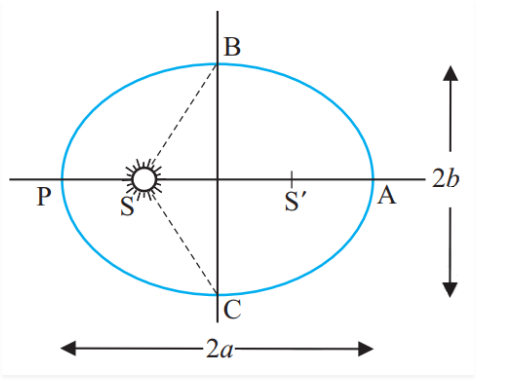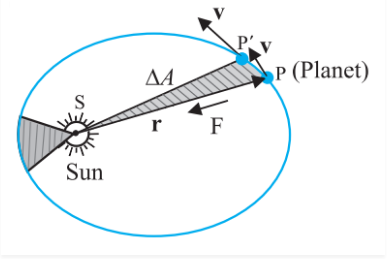Kepler’s law explains the motions of planets in the solar system.
Kepler’s First Law: All the planets move around the sun in elliptical orbits with the sun at the focus.

Kepler’s Second Law: The line joining the planet to the sun sweeps out equal areas in an equal interval of time.

ΔA is the area swept
Δt is the time interval
Kepler’s Third Law: This law states that the square of the time period (P) is directly proportional to the cube of the semi-major axis of its orbit.
P2 ∝ a3
Q1: When a planet orbits the Sun, one of the foci of the elliptical orbit is
- The axis
- The perihelion
- The centre
- The Sun
Answer: (d) The Sun
Q2: What has an eccentricity of zero?
- A straight line
- A large ellipse
- A circle
- A small ellipse
Answer: (c) A circle
Q3: An Astronomical Unit, or AU, is the average distance between
- The Sun and Neptune
- The Sun and Earth
- The Earth and the Moon
- The Sun and Mercury
Answer: (b) The Sun and Earth
Q4: Kepler’s second law is known as
- The Law of Orbits
- The Law of Areas
- The Law of Periods
- The Law of Gravity
Answer: (b) The Law of Areas
Q5: Kepler’s 2nd law deals with
- The shape of the planet’s orbits
- The speed/area the planet travels
- The length of time it takes the planet to orbit the sun
- Time travel
Answer: (b) The speed/area the planet travels
Q6: Kepler’s third law is known as
- The Law of orbits
- The Law of Areas
- The Law of periods
- The Law of gravity
Answer: (c) The Law of periods
Q7: The formula for Kepler’s third law is
- P3 ∝ a2
- P3 ∝ a3
- P2 ∝ a2
- P2 ∝ a3
Answer: (d) P2 ∝ a3
Q8: Kepler’s first law states that the orbits of the planets are oval in shape or
- Ellipses
- Perfect circles
- Squares
- triangles
Answer: (a) Ellipses
Q9: The Kepler’s first law is known as
- The law of orbits
- The law of areas
- The law of periods
- The law of gravity
Answer: (a) The law of orbits
Q10: The farther away a planet is from the sun, the …………. it takes it to orbit the sun once
- Longer
- Shorter
Answer: (a) Longer
Recommended Video:
Force and Laws of Motion | NEET 2023 Physics Exam

Must Solve NEET Physics MCQ Topics:
- Optical Instrument MCQs
- Transistor MCQs
- Perfectly Inelastic Collision MCQs
- Oscillation MCQs
- Semiconductor Diode MCQs
Comments